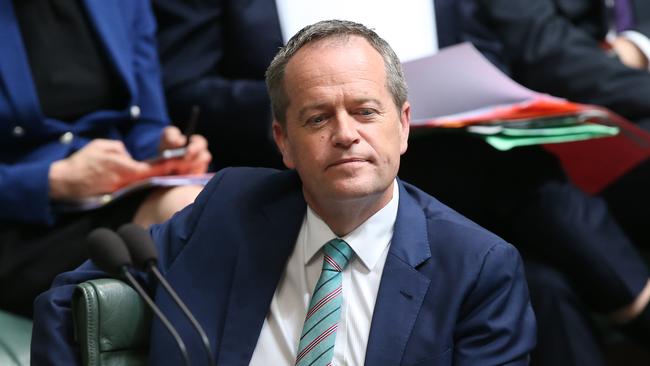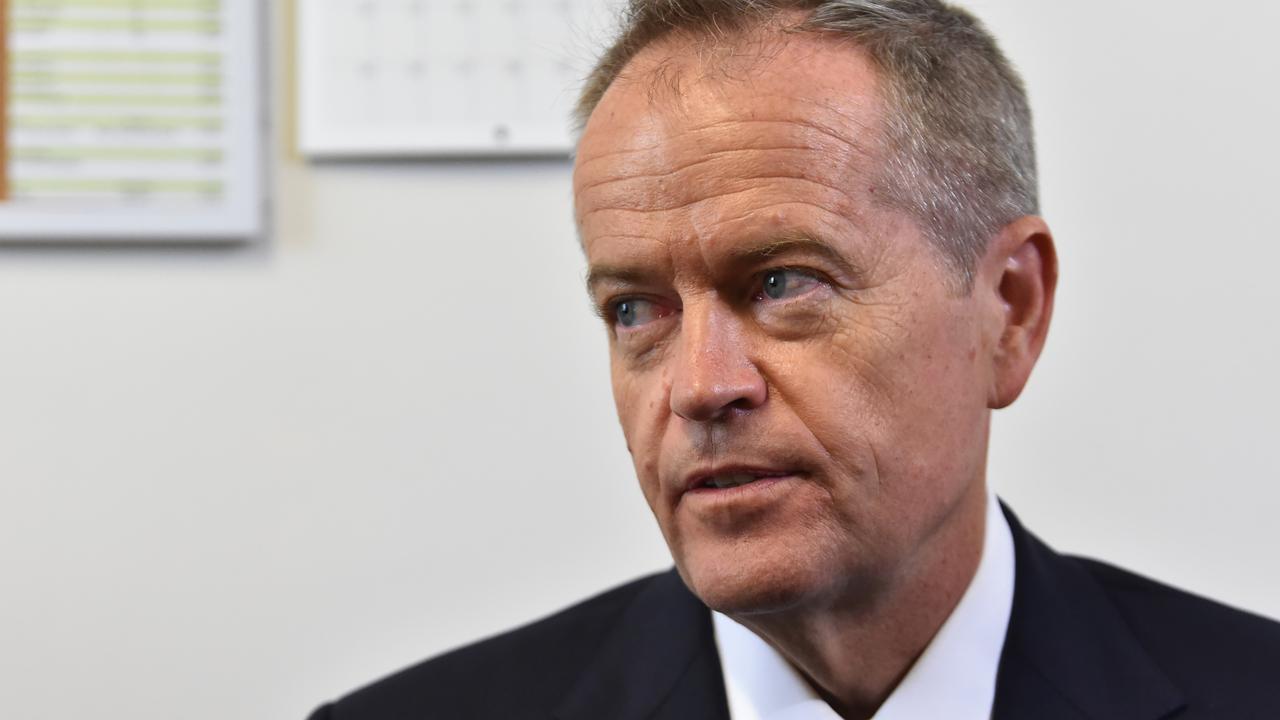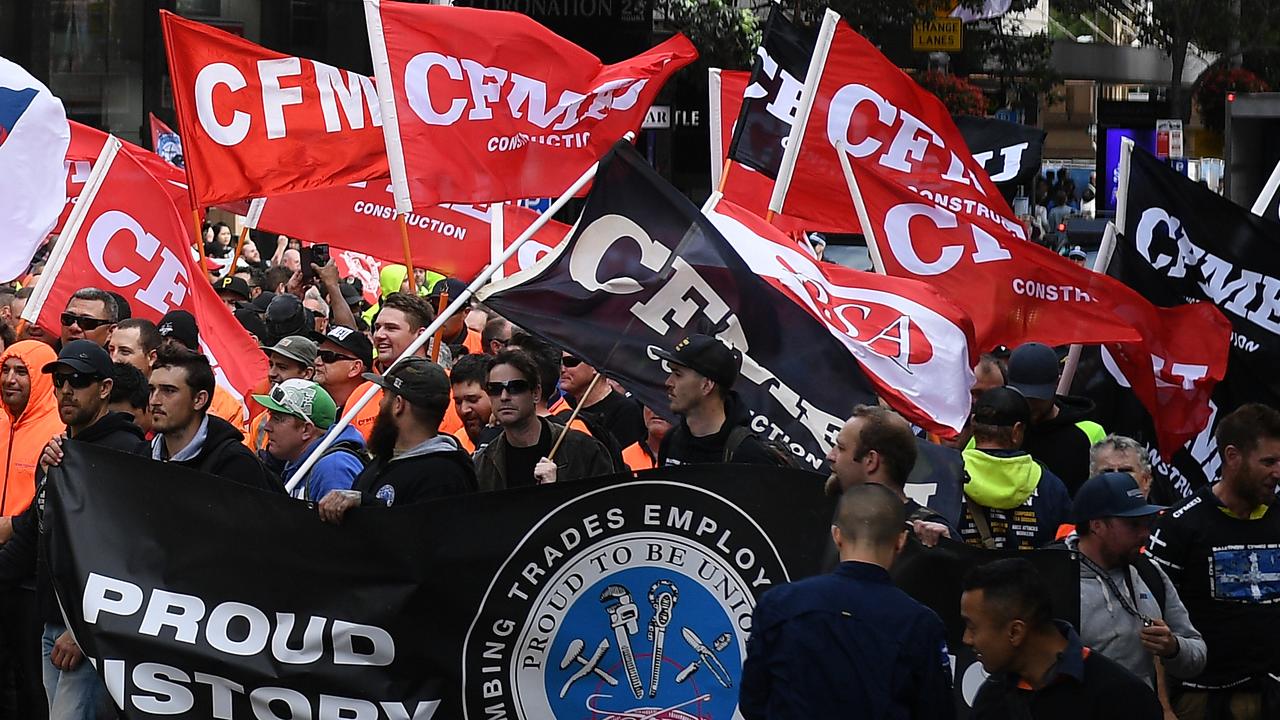Unions attack Bill Shorten on China FTA
Unions split with Labor over Bill Shorten’s deal with Malcolm Turnbull that finalises China FTA before Christmas.

Unions have split with Labor over Bill Shorten’s deal with Malcolm Turnbull that will finalise the China free-trade agreement before Christmas and allow millions of dollars in tariff cuts to flow to Australian exporters.
Unions attacked the deal, announced early yesterday, and the Australian Council of Trade Unions will dramatically step up its town hall meetings to condemn the agreement, with 20 to be held in the next fortnight.
The Construction Forestry Mining and Energy Union and the Electrical Trades Union have led a ferocious campaign against the China trade deal over foreign worker concerns. Last night the ETU blasted the safeguards negotiated by Labor as “inadequate’’ and condemned both sides of politics.
The Opposition Leader insisted Labor had negotiated “significant concessions’’ and the government had agreed to legal safeguards that would be enshrined in regulations in the Migration Act. Mr Shorten also flagged the prospect of Labor taking a tougher temporary work visa regime to the next election.
ETU national secretary Allen Hicks said the union accepted Labor had negotiated in “good faith, but unfortunately the outcome does not provide meaningful protections for Australian workers”.
“We are left with little option but to condemn both sides of politics for what has been done today,” Mr Hicks said.
Opposition immigration spokesman Richard Marles and employment spokesman Brendan O’Connor have been charged with reviewing all forms of temporary work visas and “identifying ways in which a Labor government can make our system fairer and more effective’’.
After a week of negotiations between Trade Minister Andrew Robb and Labor’s trade spokeswoman, Penny Wong, Mr Robb gave Labor a written guarantee on a series of issues Labor had been advocating to secure a deal.
The deal allowed debate on a tariff amendment bill, which is the enabling legislation for the agreement, to begin in the House of Representatives. The government will now have the numbers to pass the necessary legislation in the Senate next month.
Bringing the deal into force will lead to tariffs being cut on a range of agricultural exports, including beef, dairy and wool, as well as on resources exports such as coal.
Under the agreement with Labor, the government will enshrine labour market testing in a Migration Act regulation. All employers seeking to sponsor 457 visa workers must first demonstrate they have made recent and genuine efforts to recruit Australian workers. The government also agreed to link 457 visa pay and conditions to relevant enterprise agreements and to bring forward a review of the Temporary Skills Migration Income Threshold.
Labor had asked for an increase in the threshold from $53,900 to $57,000, but dropped this request after The Australian revealed it would knock out up to one quarter of 457 visas and have a negative impact on rural and regional areas.
The government agreed to a tighter skills regime for licensed trades, requiring the migrant worker to obtain the relevant licence within 90 days after arrival in Australia.
Labor had been pushing for a 60-day requirement, but agreed on 90 days to align the time with other parts of the regime.
“Labor, I believe, has secured through constructive negotiation, through community concern and through good dialogue and sensible proposals, greater protections for Australian jobs,’’ Mr Shorten said.
Describing the significance of the deal for Australia, the Prime Minister said the opportunities in the Chinese market were limited “only by our imagination and enterprise’’. Mr Turnbull said the government appreciated “the commonsense response” of the opposition to the trade deal.
“I had earlier, perhaps a little harshly, said that the Leader of the Opposition was just a cork bobbing in the slipstream of the CFMEU,” Mr Turnbull said. “Well, he has struck out; he is swimming, he is paddling himself, and it has been a great day for the parliament.’’
Mr Robb said bipartisan agreement on the trade deal would boost business confidence. He said he had communicated the deal to the Chinese government, which was comfortable with it.
“Importantly, the agreement we’ve reached with the opposition will in no way contravene the commitments that have been made in the free-trade agreement and it in no way discriminates against our major trading partner,’’ Mr Robb said.
Business Council of Australia chief executive Jennifer Westacott praised both parties for “rising above a misleading fear campaign by some Australian unions’’. “Ratifying the agreement by the December 31 deadline enables the full benefit of a double tariff cut to be realised for the Australian economy,’’ Ms Westacott said.
Construction union boss Dave Noonan said the union would “be a thorn in the side of any politician that doesn’t stick up for working people”.
“We’ll take the progress that’s been made but we’ll be very keen to make sure that the Labor Party and indeed the Liberal Party begin thinking about the interests of ordinary Australian workers when they frame migration and workplace policies,” Mr Noonan said. “The concessions that have been gained by the Australian Labor Party under the free-trade agreement are significant, they’re very important, and they would not have occurred if there hadn’t been a trade union campaign and they would not have occurred if Bill Shorten hadn’t stood up and took on the vested interests that tried to howl him down over this issue.”
The ACTU will go ahead with a series of town hall meetings on the trade deal despite the bipartisan support for the agreement.
“While we appreciate the efforts of Penny Wong and Bill Shorten to fix a bad deal, the proposed changes simply do not go far enough,’’ ACTU president Ged Kearney said.
“Australian unions will be holding town hall debates with government MPs around the country next week. We urge Bill Shorten and Senator Wong to continue their participation in this debate and hear our communities concerns.’’
Former ACTU secretary Greg Combet defended Labor. “The deal achieved by the Labor Party to buttress the China-Australia free-trade agreement to improve protections for workers is an important breakthrough,’’ he said.
The Australian has learned the ACTU will front 20 debates on the topic “Will the China free-trade agreement be good for local jobs?” in town halls and community centres for a fortnight starting on Monday at the Geelong RSL.





